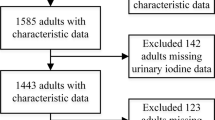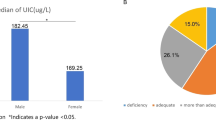Abstract
Excessive iodine intake is known to induce hypothyroidism in people who have underlying thyroid disorders. However, few studies have been performed on subjects with normal thyroid function without a history of autoimmune thyroid disease. We hypothesized that high iodine intake may cause a subtle change in thyroid function even in subjects with normal thyroid function. We analyzed 337 subjects (64 men and 273 women; mean age, 49 years) who showed normal levels of thyroid peroxidase antibodies (TPO-Ab) and thyroglobulin antibodies (Tg-Ab) by measuring the urinary iodine excretion, free T4 (FT4), and thyroid-stimulating hormone (TSH). The results showed urinary iodine excretion had negative correlation with FT4 (γ = −0.11, p = 0.043) and showed a positive trend with TSH (γ = 0.10, p = 0.068). We found that 61.7% of subjects had circulating TPO-Ab within normal reference range. In all subjects, TPO-Ab levels were negatively correlated with FT4 (γ = −0.17, p = 0.002) and positively with TSH (γ = 0.13, p = 0.021). In conclusion, high iodine intake can negatively affect thyroid hormone levels in subjects with normal thyroid function. Population-based study will be helpful for further clarification.

Similar content being viewed by others
References
Laurberg P, Cerqueira C, Ovesen L et al (2010) Iodine intake as a determinant of thyroid disorders in populations. Best Pract Res Clin Endocrinol Metab 24:13–27
Braverman LE (1994) Iodine and the thyroid: 33 years of study. Thyroid 4:351–356
Roti E, Uberti ED (2001) Iodine excess and hyperthyroidism. Thyroid 11:493–500
Laurberg P, Bulow Pedersen I, Knudsen N et al (2001) Environmental iodine intake affects the type of nonmalignant thyroid disease. Thyroid 11:457–469
Laurberg P, Pedersen KM, Hreidarsson A et al (1998) Iodine intake and the pattern of thyroid disorders: a comparative epidemiological study of thyroid abnormalities in the elderly in Iceland and in Jutland, Denmark. J Clin Endocrinol Metab 83:765–769
Li Y, Teng D, Shan Z et al (2008) Antithyroperoxidase and antithyroglobulin antibodies in a five-year follow-up survey of populations with different iodine intakes. J Clin Endocrinol Metab 93:1751–1757
Kahaly GJ, Dienes HP, Beyer J et al (1998) Iodide induces thyroid autoimmunity in patients with endemic goitre: a randomised, double-blind, placebo-controlled trial. Eur J Endocrinol 139:290–297
Kim JY, Moon SJ, Kim KR et al (1998) Dietary iodine intake and urinary iodine excretion in normal Korean adults. Yonsei Med J 39:355–362
Teng W, Shan Z, Teng X et al (2006) Effect of iodine intake on thyroid diseases in China. N Engl J Med 354:2783–793
Wolff J, Chaikoff IL et al (1949) The temporary nature of the inhibitory action of excess iodine on organic iodine synthesis in the normal thyroid. Endocrinology 45:504–513
Eng PH, Cardona GR, Fang SL et al (1999) Escape from the acute Wolff–Chaikoff effect is associated with a decrease in thyroid sodium/iodide symporter messenger ribonucleic acid and protein. Endocrinology 140:3404–3410
Philippou G, Koutras DA, Piperingos G et al (1992) The effect of iodide on serum thyroid hormone levels in normal persons, in hyperthyroid patients, and in hypothyroid patients on thyroxine replacement. Clin Endocrinol Oxf 36:573–578
Allen EM, Appel MC, Braverman LE (1986) The effect of iodide ingestion on the development of spontaneous lymphocytic thyroiditis in the diabetes-prone BB/W rat. Endocrinology 118:1977–1981
Yoshida H, Amino N, Yagawa K et al (1978) Association of serum antithyroid antibodies with lymphocytic infiltration of the thyroid gland: studies of seventy autopsied cases. J Clin Endocrinol Metab 46:859–862
Kasagi K, Kousaka T, Higuchi K et al (1996) Clinical significance of measurements of antithyroid antibodies in the diagnosis of Hashimoto’s thyroiditis: comparison with histological findings. Thyroid 6:445–450
Rieu M, Richard A, Sadoudi R et al (1995) Effects of thyroid status on thyroid autoimmunity expression in surgically induced hypothyroid patients with Graves’ disease. Horm Res 44:29–34
Bulow Pedersen I, Laurberg P, Knudsen N et al (2005) A population study of the association between thyroid autoantibodies in serum and abnormalities in thyroid function and structure. Clin Endocrinol Oxf 62:713–720
Author information
Authors and Affiliations
Corresponding author
Rights and permissions
About this article
Cite this article
Hwang, S., Lee, E.Y., Lee, W.K. et al. Correlation Between Iodine Intake and Thyroid Function in Subjects with Normal Thyroid Function. Biol Trace Elem Res 143, 1393–1397 (2011). https://doi.org/10.1007/s12011-011-8997-x
Received:
Accepted:
Published:
Issue Date:
DOI: https://doi.org/10.1007/s12011-011-8997-x




